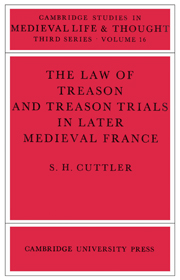Book contents
- Frontmatter
- Contents
- Dedication
- Preface
- Abbreviations
- Introduction
- 1 THE CONCEPT OF TREASON IN LATER MEDIEVAL FRANCE: LEGISTS, ‘COUTUMIERS’ AND TREATISE-WRITERS
- 2 THE CRIMES OF TREASON
- 3 JURISDICTION
- 4 PROCEDURE AND THE TRIAL OF PEERS
- 5 PUNISHMENT, FORFEITURE AND PARDON
- 6 TREASON AND THE CROWN 1328–1356
- 7 TREASON AND THE CROWN 1356–1380
- 8 TREASON AND THE CROWN 1380–1422
- 9 TREASON AND THE CROWN 1422–1461
- 10 TREASON AND THE CROWN 1461–1494
- Conclusion
- Bibliography
- Index
10 - TREASON AND THE CROWN 1461–1494
Published online by Cambridge University Press: 13 October 2009
- Frontmatter
- Contents
- Dedication
- Preface
- Abbreviations
- Introduction
- 1 THE CONCEPT OF TREASON IN LATER MEDIEVAL FRANCE: LEGISTS, ‘COUTUMIERS’ AND TREATISE-WRITERS
- 2 THE CRIMES OF TREASON
- 3 JURISDICTION
- 4 PROCEDURE AND THE TRIAL OF PEERS
- 5 PUNISHMENT, FORFEITURE AND PARDON
- 6 TREASON AND THE CROWN 1328–1356
- 7 TREASON AND THE CROWN 1356–1380
- 8 TREASON AND THE CROWN 1380–1422
- 9 TREASON AND THE CROWN 1422–1461
- 10 TREASON AND THE CROWN 1461–1494
- Conclusion
- Bibliography
- Index
Summary
Within months of ascending the throne in 1461 Louis XI pardoned Alençon, Armagnac and Jacques de Pons, prosecuted some of his Dauphinois subjects on charges of treason for their disloyalty to him when he was dauphin, purged some of his father's officers and councillors, and prosecuted at least one of them – Antoine de Chabannes, count of Dammartin – as a traitor. Louis XI's grudge against the count went back at least fifteen years to 1446: it was Chabannes who had betrayed to Charles VII his planned coup d'état, and it was Chabannes, furthermore, who in 1456 had led the royal army against him in the Dauphiné.
On 5 September 1461 Louis XI instructed his proctor-general to begin proceedings in the Parlement against Chabannes. After three defaults the count thought better of remaining in exile, gave himself up, and was imprisoned first in the Conciergerie, then in the Louvre. During his trial pressure was exerted on the Parlement by both Louis XI and Charles de Melun, bailli of Sens, to whom the king had promised Chabannes's property. Either unable or unwilling to thwart Louis XI, the court convicted Chabannes of treason on 20 August 1463.
Louis XI's motive in this case had not been solely one of revenge. Surely the one reason why he had Chabannes tried in the Parlement rather than by commission was to have himself publicly exonerated of the accusations levied against him when he was dauphin.
- Type
- Chapter
- Information
- The Law of Treason and Treason Trials in Later Medieval France , pp. 213 - 237Publisher: Cambridge University PressPrint publication year: 1982

